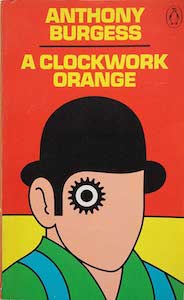


Burgess explains his logic, while admitting the reasons why we may agree with the US editor (I agree with Burgess, myself, but then I'd been utterly unaware of the question). This audio book adds-back the last chapter, deleted from the US book and the film. No matter whether you've seen the Stanley Kubrick movie, or read the book - "Clockwork Orange" demands the spoken word, especially all the bits of British accents but also a made-up language and a very neat "voice" for "little Alex" (the Malcolm McDowell character in the iconic picture, bowler hat, eye makeup and stiletto). This audio book beats written and even the movie I thought it added humor to the story and made it more enjoyable, but other listeners may find it to be overwhelming. The narrator also does a wonderful job with it (pausing in all the right places, etc.), and makes it much more comprehensible. It makes the story a bit difficult to comprehend at first, but you get used to it before long.

Also, the book employs a great deal of slang, called Nadsat. If you think this might be a problem for you, then you should probably not purchase this audiobook. However, this book employs some rather extreme violence, (e.g., the raping of young girls, the beating of an old man) to convey its messages. Overall it is an amazing book, and the narration is phenomenal. It alternates between being humorous, shocking, and thought-provoking. On a deeper level, it is also a social commentary on youth violence, psychiatry, morality, and other social issues (this is much more apparent in the book than it is in the film). On the surface, A Clockwork Orange is a depiction of an apalling young man who commits a variety of violent acts and the government's attempts to redeem him. In his introduction, Blake Morrison situates A Clockwork Orange within the context of Anthony Burgess's many other works, explores the author's unhappiness with the Stanley Kubrick film version, analyses the composition of the Nadsat argot spoken by Alex and his droogs, and examines the influences on Burgess's unique, eternally original style.Great book, great narration, but not for everyone The basis for Stanley Kubrick's notorious 1971 film, A Clockwork Orange is both a virtuoso performance from an electrifying prose stylist and a serious exploration of the morality of free will. But when Alex finds himself at the mercy of the state and subject to the ministrations of Dr Brodsky, and the mind-altering treatment of the Ludovico Technique, he discovers that fun is no longer the order of the day. He and his gang of droogs rampage through a dystopian future, hunting for terrible thrills. Burroughs Fifteen-year-old Alex doesn't just like ultra-violence - he also enjoys rape, drugs and Beethoven's ninth. I do not know of any other writer who has done as much with language.


 0 kommentar(er)
0 kommentar(er)
